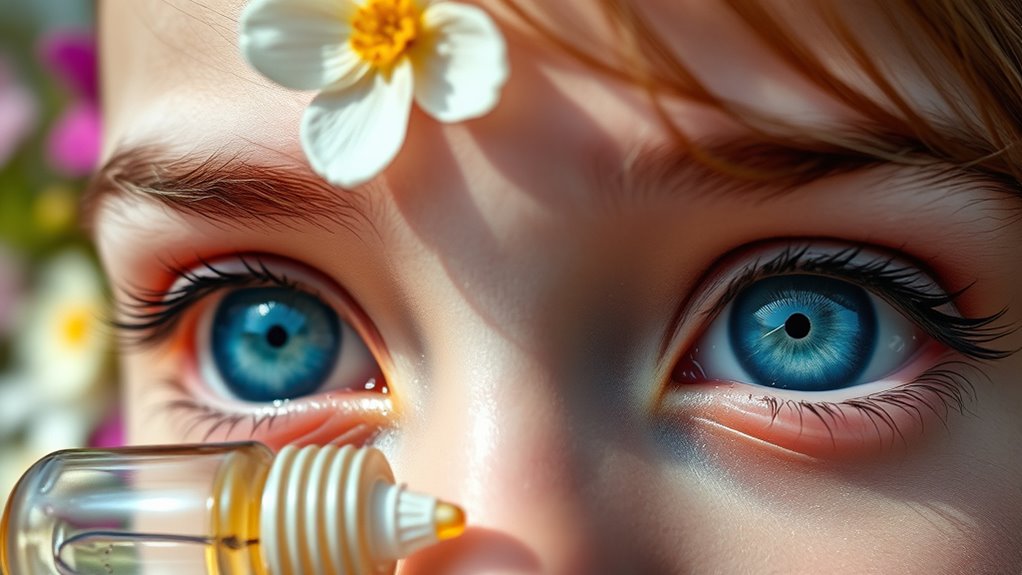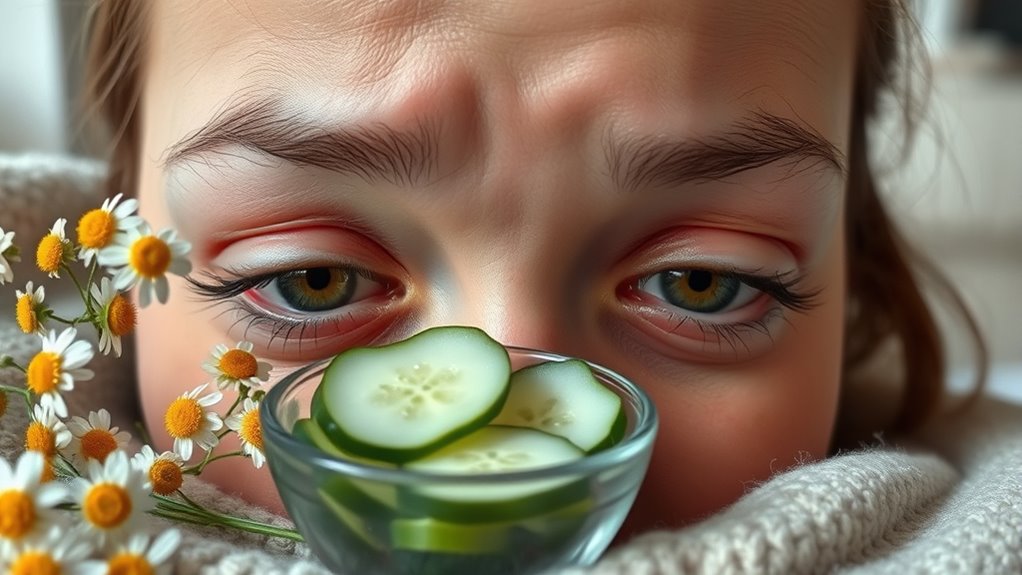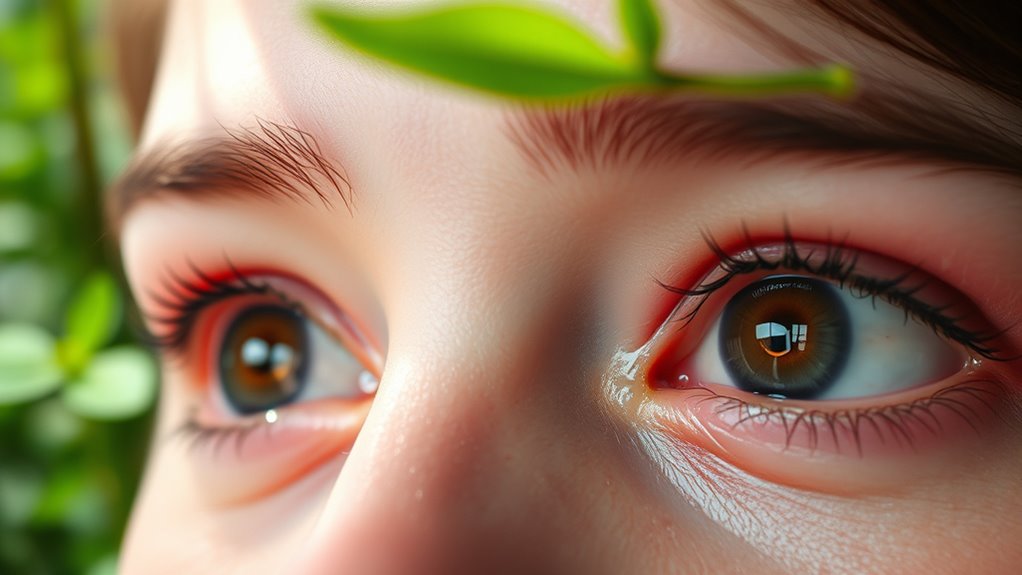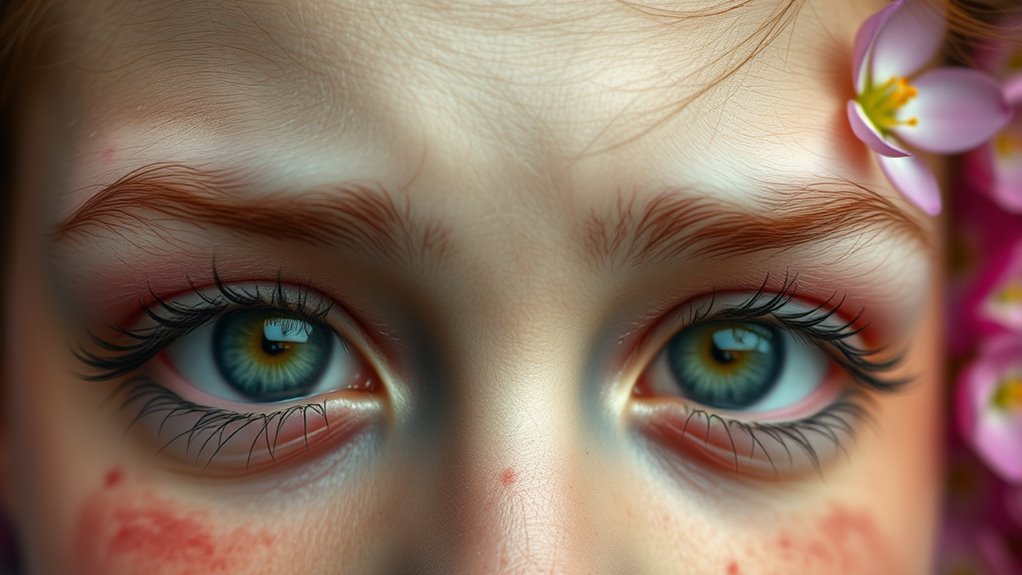Dealing with eye allergies this season? You can stop the itch by avoiding allergens like pollen and pet dander. Use over-the-counter antihistamine eye drops and try saline rinses for quick relief. Cold compresses can soothe irritation, too. Keep your home clean to lower dust mite exposure. If your symptoms persist or worsen, it might be time to consult an eye specialist for tailored treatment. Discover more about managing your eye allergies effectively as you explore your options.
Key Takeaways
- Identify and avoid allergens like pollen, pet dander, and dust mites to reduce eye irritation.
- Use over-the-counter antihistamine eye drops for immediate relief from itching and redness.
- Apply a cold compress over closed eyelids to soothe irritation and reduce swelling.
- Maintain a clean home environment by regularly washing bedding and using air purifiers.
- Consult an allergist or eye specialist if symptoms persist or worsen despite home treatments.
Understanding Eye Allergies and Their Symptoms

If you’ve ever experienced itchy, red eyes during certain seasons or around pets, you might be dealing with eye allergies, also known as allergic conjunctivitis.
These allergies occur when your immune system overreacts to allergens like pollen, pet dander, or dust mites. Common symptoms include watery discharge, swollen eyelids, a burning sensation, and light sensitivity, which can disrupt your daily activities.
Eye allergies happen when your immune system reacts strongly to allergens, causing symptoms like watery discharge and swollen eyelids.
Seasonal allergies are often triggered by outdoor elements like tree pollen, while perennial allergies can arise from indoor irritants. The severity of your symptoms depends on how sensitive you’re to these allergens and your exposure to them.
Consult an allergist for an accurate diagnosis and tailored treatment options to find relief from itchy eyes and other discomforts.
Common Triggers for Eye Allergies

When the seasons change or you’re indoors with pets, your eyes might react to a variety of common allergens. Common triggers include pollen from trees, grasses, and weeds during spring and summer. Year-round, indoor allergens like dust mites, pet dander, and mold spores can provoke eye allergy symptoms. Irritants such as cigarette smoke and certain cosmetics can worsen your eye irritation, leading to allergic conjunctivitis.
| Trigger Type | Examples | Symptoms |
|---|---|---|
| Outdoor Allergens | Pollen | Itchy, watery eyes |
| Indoor Allergens | Dust mites, dander | Redness, swelling |
| Irritants | Smoke, perfumes | Burning sensation |
| Allergic Conjunctivitis | Various allergens | Discomfort, tearing |
| Allergy Testing | Skin or blood tests | Identifying triggers |
Identifying your specific allergy triggers can help manage symptoms effectively.
Effective Management and Treatment Options

Managing eye allergies effectively requires a combination of allergen avoidance and appropriate treatment options. To create a solid treatment plan, consider the following strategies:
- Avoid contact: Stay indoors during high pollen counts and use air purifiers to minimize dust mites and pet dander.
- Over-the-counter relief: Utilize antihistamine eye drops and saline rinses for immediate allergy relief. For severe symptoms, consult your doctor about prescription medications.
- Long-term solutions: Explore allergen immunotherapy to gradually desensitize yourself to triggers.
Additionally, cold compresses and artificial tears can help soothe irritation and flush allergens from your eyes. Regularly maintaining your air purifier filters ensures that they effectively capture allergens and improve indoor air quality.
Implementing these strategies will help you manage your symptoms and improve your quality of life.
At-Home Remedies for Eye Irritation

At-home remedies can be a game changer for relieving eye irritation caused by allergens. Start by washing your face with a mild cleanser and tepid water after exposure to irritants like pollen and dander. This helps reduce eye irritation.
Washing your face with a mild cleanser after allergen exposure can significantly alleviate eye irritation.
For immediate relief from itchy, swollen eyes, apply a cold compress over your closed eyelids. Saline rinses can also flush out allergens, mimicking natural tears to alleviate discomfort.
Using preservative-free artificial tears not only moisturizes dry eyes but also washes away allergens without causing further irritation.
Additionally, maintaining a clean home environment by regularly washing bedding in hot water and using dust mite-proof covers can greatly reduce allergen exposure, helping you find relief from those pesky allergy symptoms.
When to Consult an Eye Specialist

Eye irritation can often be managed with simple home remedies, but there are times when seeking professional help is necessary.
If you notice persistent symptoms, it’s essential to consult an eye doctor. Consider reaching out for medical advice if you experience:
- Continuous irritation, redness, or itching that doesn’t improve with over-the-counter treatments.
- Swelling in the eyelids or surrounding areas, which may indicate a more severe allergic reaction.
- Changes in vision, such as blurred vision or light sensitivity, as these could signal underlying conditions.
Don’t hesitate to contact an eye specialist if home remedies fail after a few weeks.
They can provide tailored treatment options and help identify your allergy triggers for effective long-term management.
Frequently Asked Questions
How to Stop Itchy Eyes During Allergy Season?
To stop itchy eyes during allergy season, you’ve got several effective options.
Use over-the-counter antihistamine eye drops for quick relief. Wash your face and eyelids regularly to remove allergens. A cold compress can soothe irritation, while artificial tears help flush out allergens and keep your eyes moist.
Staying indoors during peak pollen times, keeping windows closed, and using air purifiers can also greatly reduce your exposure to irritating allergens.
How Do You Calm Down an Allergic Eye?
When your eyes feel like a stormy sea, calm them with a cold compress, like a gentle breeze soothing the waves.
You can reach for over-the-counter antihistamine eye drops to block the pesky histamines, easing the chaos.
Artificial tears wash away irritants, making your eyes feel refreshed.
Remember to cleanse your face and eyelids regularly, keeping allergens at bay.
With these steps, you’ll find tranquility amidst the allergy turmoil.
How Do You Stop Itching From Seasonal Allergies?
To stop itching from seasonal allergies, try over-the-counter antihistamine eye drops for quick relief.
Applying cold compresses to your eyes can also help reduce inflammation and soothe irritation.
Regularly using artificial tears washes away allergens and keeps your eyes moist.
Don’t forget to maintain a clean environment by washing your bedding frequently and using air purifiers, as this can markedly cut down on allergens and prevent future itching.
How Long Do Itchy Eyes From Allergies Last?
Itchy eyes can feel like a relentless storm, crashing down on your comfort. Depending on your exposure to allergens and how sensitive you are, those pesky symptoms can last anywhere from a few hours to several days.
If you’re dealing with seasonal allergies, the discomfort usually fades when the allergens disappear. However, if you’re facing year-round irritants, you might find your itchy eyes sticking around for longer than you’d like.
Conclusion
As you navigate the seasonal dance of allergens, remember you’re not alone in this battle against itchy eyes. With the right strategies, you’ll find relief that feels like a refreshing change. Whether you opt for over-the-counter solutions or simple home remedies, don’t let allergies steal your joy. Just like spring flowers bloom anew, you too can emerge vibrant and free from irritation. So, take charge and let your eyes shine bright this season!









